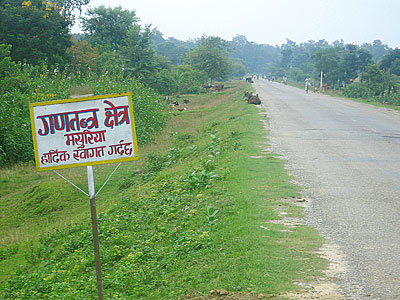 KIRAN NEPAL |
What kind of federation Nepal should be and on what bases? Academics, activists, individuals with interest in the subject and a few politicians came together this week to share and exchange their views on this highly emotive subject.
'Ethnicity and Federalisation', organised by Tribhuvan University's Central Department of Sociology and Anthropology, was perhaps a year late. Ideally, this symposium should have been held soon after CA's term was extended by a year on 28 May 2010. Still, the effort is laudable since it attempts to engage people on a subject that has been, as usual, sacrificed on the altar of populism by a few political parties and activist organisations. The nation-wide debate and discourse that the department hopes to generate, and perhaps facilitate, could have created the necessary pressure on our politicians, donor-driven and I/NGO activists to treat the subject with the caution and respect it deserves had it began last year.
But better late than never. With the CA likely to be extended, the basis, nature, shape, nomenclature and number of provinces of federal Nepal would attract more and more attention, discourse and heated debate. Rest assured, we are going to suffer numerous bandas like the one on Wednesday.
A few CA members who came for the symposium on the last day objected to 'interference' on their home turf, arguing that one of the thematic committees of the CA had already 'decided' on the issue. This is bogus since the full assembly is yet to take up the subject and decide on it. Moreover, it has to be debated and endorsed by the larger public as required by existing provisions. A thorough and broader engagement with people is needed on an issue that is likely to have far-reaching consequences for the future Nepali state.
It is clear that our politics and polity is always influenced by four issues: the future of ex-Maoist combatants, the electoral system, the governance system, and the shape, nature, name and number of federal units of the Nepali state. The last one is the most sensitive and fraught with danger since the emotions of marginalised groups have been fanned so high that it would be very difficult, if not impossible, to have any meaningful and rational discussion. With the integration/rehabilitation and musical chair on governments taking up most of the last three years since the election of the CA, the federalisation of Nepal did not get the attention and the debate it deserved.
Almost all political parties for federation agree that identity has to be one of the basis for federalising Nepal. They disagree on how to determine that identity and what kind of identity should be considered. In addition to disagreements over the basis for federalising Nepal, there are two other issues that are sure to invite fierce opposition: agradhikar (privileged right) of the dominant community in a state and right to self-determination. The fear is this would create second-class citizens out of people who will be in a majority given the number and heterogenous mix of Nepalis in any future province.
Will identity alone ensure the right to local resources and livelihood? After all, once politics over creating a federal state is over, the question of employment and resource ownership will begin to dominate. What will be our model? India, which is federal in form but is unitary in spirit? The US, whose states have well-rooted democratic institutions and economy? Or South Africa, which has adopted a co-operative federation?
There's no way we can avoid federalising Nepal. But let us discuss it without recourse to populism and without baggage.
Read also:
One month to go, EDITORIAL



